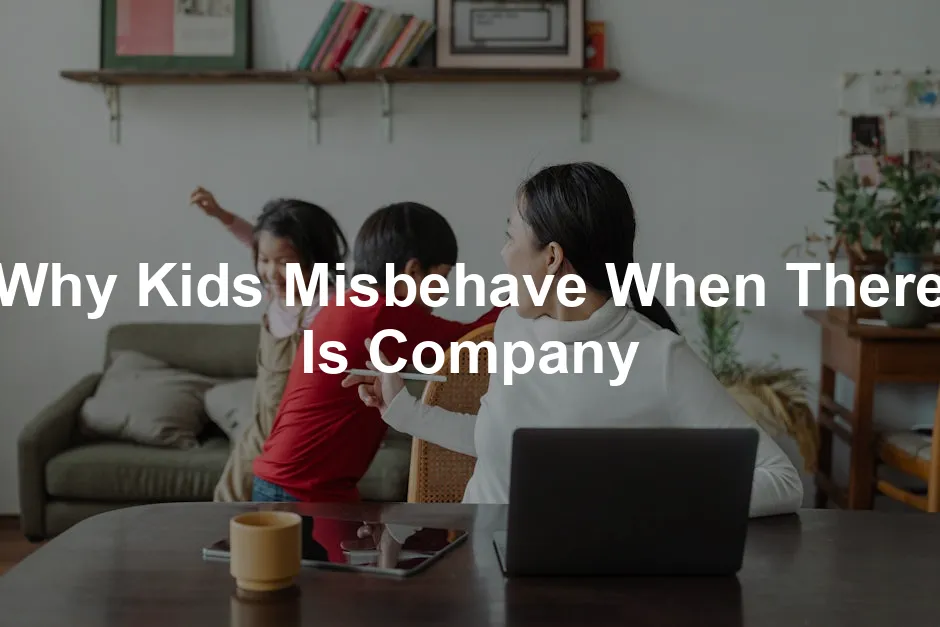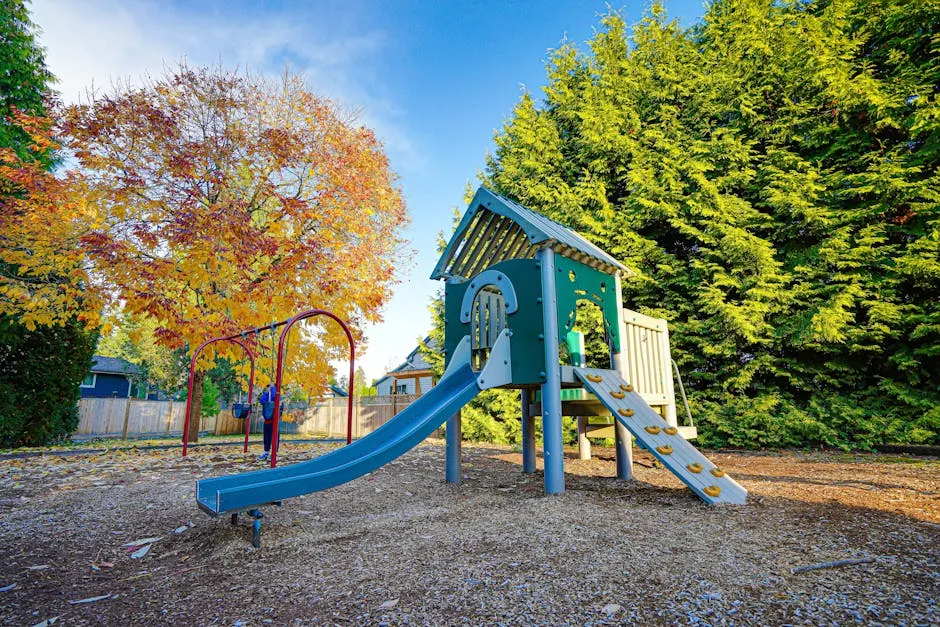
Why Kids Misbehave When There Is Company
Introduction
Have you ever felt embarrassed by your child’s behavior in front of guests? This is a common experience for many parents. Kids can act out when company arrives, leaving parents feeling frustrated and ashamed. Understanding why this happens is crucial. By grasping the underlying reasons for their misbehavior, you can manage these situations more effectively.
To help you navigate these parenting challenges, consider reading Parenting with Love and Logic: Teaching Children Responsibility. This book provides insightful strategies that can help you raise responsible and capable children while also minimizing those embarrassing moments.

Summary and Overview
Children often misbehave when there are guests due to various factors. First, they may seek attention from their parents, especially when your focus shifts to visitors. This desire can lead to disruptive behaviors. Additionally, social situations can be overwhelming. Kids might feel anxious or unsure about how to behave around unfamiliar people.
Moreover, the presence of guests can trigger sibling rivalry. Kids may compete for attention, leading to conflicts. It’s also common for children to feel tired or hungry during gatherings, which can contribute to their misbehavior. You might find that engaging with books like Siblings Without Rivalry: How to Help Your Children Live Together So You Can Live Too can provide valuable insights on managing sibling dynamics.
This article will share strategies to address these challenges. Proactive parenting is vital. Setting clear expectations before company arrives can significantly reduce misbehavior. Understanding your child’s emotional needs is key to ensuring everyone has a positive experience during visits.

Understanding the Reasons for Misbehavior
Attention Seeking
Children often crave parental attention. When company arrives, their parents’ focus shifts to guests. This can leave kids feeling neglected. To regain attention, they may resort to misbehavior. This might involve acting out or creating chaos.
Research shows that children often misbehave to get noticed. Even negative attention can feel rewarding. When parents react to misbehavior, it reinforces that behavior. Kids learn that acting out gets them what they want.
It’s essential to engage with your child before and after guests arrive. Spending quality time together can fulfill their emotional needs. Play games, read together, or have a simple chat. These activities help children feel valued and secure. Consider using resources like The Whole-Brain Child: 12 Revolutionary Strategies to Nurture Your Child’s Developing Mind for strategies to engage with your child effectively.
By understanding this dynamic, parents can address attention-seeking behaviors. Instead of focusing on misbehavior, redirect attention positively. This approach can lead to better behavior, even in social situations.

Sibling Rivalry
Sibling rivalry can intensify when guests are present. Children often compete for parental attention during these times. This competition might lead to conflicts or disruptive behaviors. They may argue, push boundaries, or try to show off.
To reduce sibling rivalry, it’s important to provide individual attention. Set aside time for each child, allowing them to feel special. Engage in one-on-one activities like crafts or sports. You might find that playing games like Kids Against Maturity: A Card Game for Kids and Their Parents can foster teamwork and fun.
Promoting teamwork can also help. Organize family games that require cooperation. This not only fosters bonds but also diminishes competition. Establishing boundaries for interactions is crucial as well.
Discuss acceptable behaviors during visits. Encourage your children to support each other rather than compete. This can create a more harmonious atmosphere. Statistics indicate that sibling rivalry affects many households. Knowing this, parents can proactively address the issue.
With patience and understanding, the dynamics of sibling rivalry can improve. By focusing on individual needs and promoting teamwork, families can navigate social gatherings more smoothly.

Anxiety and Nervousness
Social situations can be overwhelming for kids. When faced with unfamiliar faces, they might feel anxious or nervous. This anxiety can lead to misbehavior. It’s essential to identify what triggers this anxiety. For some children, it could be loud noises or too many people. Others might feel uncomfortable being judged or evaluated. Understanding these feelings is crucial, as why does nervousness affect performance in competitive environments can shed light on their behavior.
Understanding the impact of nervousness on children’s behavior can help parents manage anxiety more effectively. why does nervousness affect performance in competitive environments
Preparing your child ahead of time can ease their nerves. Discuss the event and what to expect. Role-playing scenarios can also help them practice appropriate behavior. Familiarity plays a significant role in reducing anxiety. When children are used to the environment or the people present, they feel more secure.
Research shows that many children experience anxiety in social contexts. Understanding this can help parents create coping strategies. By recognizing anxiety triggers, parents can better support their children. A useful resource is The Anxiety Workbook for Teens: Activities to Help You Deal with Anxiety and Feel Better, which can provide strategies that resonate with older kids.

Confusion About Social Norms
Children may not grasp what’s expected in social gatherings. They might not understand the unspoken rules of etiquette. This confusion can lead to misbehavior as they try to navigate these interactions. Explaining social norms clearly is crucial. Take the time to discuss what behavior is appropriate.
Role-playing can be a fun way to teach these expectations. By acting out scenarios, kids learn how to behave in different situations. Setting clear behavioral expectations before guests arrive is also beneficial. This clarity helps children feel more secure and confident.
Studies indicate that children often struggle with understanding social norms. Educating them can significantly improve their behavior during gatherings. When children know what to expect, they are less likely to misbehave. Being proactive about social etiquette can enhance their social experiences.

Tiredness and Hunger
Have you ever noticed your child acting out when guests are around? Tiredness and hunger can play a significant role in this behavior. When kids are fatigued or hungry, they often struggle with self-control. These feelings can lead to crankiness, making it difficult for them to behave appropriately.
Maintaining routines during social events is crucial. Kids thrive on structure. If their usual meal or nap times are disrupted, they may feel unsettled. To prevent this, try to keep meal and sleep schedules consistent, even during gatherings.
Before guests arrive, ensure your child has had a nutritious meal and adequate rest. A well-fed and well-rested child is generally happier and more manageable. It’s also helpful to recognize signs of tiredness and hunger. Look for cues like fussiness, yawning, or lack of focus. These signals can indicate your child needs a break or a snack.
Research shows that nutrition and sleep significantly impact children’s behavior. When kids lack proper nutrition or sleep, their behavior can become unpredictable. To support positive behavior during social events, prioritize your child’s needs. You might also want to explore products like VTech Sit-to-Stand Learning Walker to keep them engaged while promoting physical activity.

By being proactive, you can help ensure everyone has a pleasant experience, including your child.
Offering Positive Reinforcement
Praising good behavior when guests are around is vital. Kids thrive on positive feedback. It boosts their confidence and encourages them to repeat those behaviors. When you notice your child sharing toys or using polite language, acknowledge it. Simple phrases like “I love how you shared your toys!” can make a big difference.
To reinforce appropriate actions, establish a reward system. Stickers, extra playtime, or a small treat can motivate your child. This approach helps them associate good behavior with positive outcomes. Consistency is key. Ensure you recognize their efforts regularly, not just during gatherings.
Positive feedback significantly impacts children’s behavior. It teaches them that good actions are valued. This, in turn, reduces the likelihood of misbehavior. When kids feel appreciated, they are more likely to act appropriately around guests. You might also consider using Melissa & Doug Wooden Toy Chest as a way to encourage organization and reward good behavior.

Creating a Designated Play Area
Setting up a specific play area for children during visits can work wonders. This dedicated space allows them to engage in activities while adults socialize. A controlled environment limits distractions and helps kids feel secure.
Consider including various activities in the play area. Options could be puzzles, art supplies, or a small play kitchen. These activities can keep kids occupied and entertained. Encouraging independence within this space fosters creativity and self-reliance. For instance, a KidKraft Wooden Play Kitchen can provide endless imaginative play opportunities.
A designated play area benefits everyone involved. It minimizes disruptions and provides a safe space for children to express themselves. Plus, it allows parents to interact with guests without constant interruptions.

Monitoring Behavior
Keeping an eye on children during gatherings is essential. Discreetly observing interactions helps prevent potential issues. Position yourself in a way that allows you to monitor without being intrusive.
Know when to intervene. If you notice escalating tensions or disruptive behavior, step in calmly. Address the situation with gentle reminders about expected behavior. After the event, discuss their actions with them. Ask how they felt and what they could do differently next time.
This approach reinforces learning and understanding. It helps children process their emotions and learn appropriate responses. Discussing behavior after the gathering encourages reflection and growth. You might also want to try some classic games like Twister Game to promote laughter and bonding.

Conclusion
Understanding why kids misbehave in social settings is crucial for parents. It allows for proactive parenting and clear communication. By focusing on emotional needs, positive reinforcement, and setting up supportive environments, you can enhance the experience for everyone. Approach these situations with patience and understanding. Remember, fostering a positive atmosphere benefits both you and your child. Additionally, exploring why are coping strategies essential for handling anxiety in daily life can further assist in managing children’s emotional responses.

Understanding coping strategies is essential for managing anxiety in children, especially during social events. why are coping strategies essential for handling anxiety in daily life
Please let us know what you think about our content by leaving a comment down below!
Thank you for reading till here 🙂
All images from Pexels




